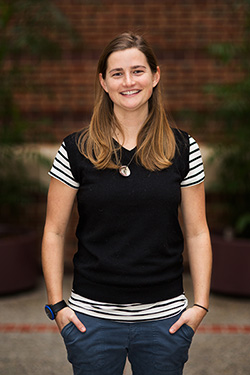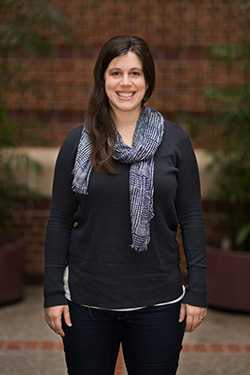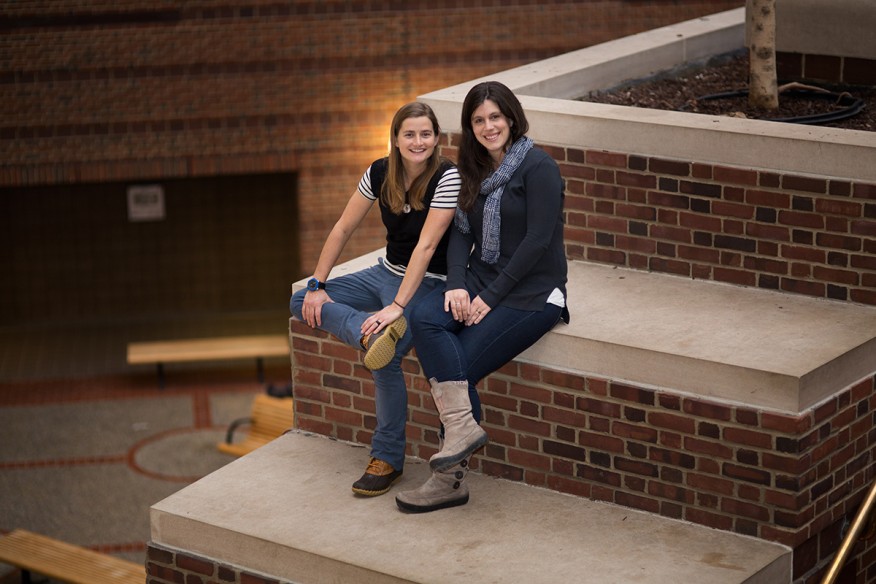The Dow Sustainability Fellows Program supports teams of graduate students and postdoctoral scholars in finding interdisciplinary solutions to local, national, and global sustainability challenges.
The goal of the Dow Sustainability Fellows program is to create a community of scholars devoted to developing and implementing innovative ideas in pursuit of sustainability. Each year, the program provides a select group of outstanding graduate students with the resources and opportunities necessary to become sustainability leaders in academia, business, non-profit organizations, and government.
Lauren Beriont
 Graduates: April 2018; Concentration: Community Organizing and Community and Social Systems; part of Michigan Scholars Program
Graduates: April 2018; Concentration: Community Organizing and Community and Social Systems; part of Michigan Scholars Program
Like many of our leaders and best, Lauren took a roundabout route to her passion. She came to U-M as an undergraduate intending to study biology and history. Then she read Guns Germs and Steel, Jared Diamond’s landmark account of how geography and environment shape society. She switched to environmental science and sustainability, then added social science.
Lauren is especially interested in food sustainability. She helped found a sustainability food program at U-M’s campus farm (at the Matthaei Botanical Gardens). After graduation she moved to Madison, Wisconsin, where she directed neighborhood initiatives for a sustainability nonprofit. She founded a coalition uniting nonprofit and community leaders with representatives of the city of Madison to discover more empowered, inclusive ways of addressing environmental issues. Lauren was finding herself drawn macro social work practice—large-scale interventions, such as the Madison coalition, that affect entire communities. And it seemed there was one particular school of social work that was the best in the country for macro practice…
So Lauren is back in Ann Arbor for her Master’s in Social Work. And more.
“I applied to be a Dow Fellow,” she says, “so I could continue to work at the intersection of environmental well-being and equity. Sustainability is more than just ‘the environment.’ We can create many more connections between environmental science and other fields, including social work. How, for example, do we bridge social justice and the environment? As the Fellows form teams, I will be looking for a team with community well-being at its core. It’s exciting that this is an interdisciplinary program. I look forward to learning and working with all kinds of people.
“I am super grateful to receive the fellowship,” Lauren adds, “and to be working with peers who have a common interest in sustainability. I’m grateful for the mentorship the program provides. To be networked with so many people doing so much good work in the community is definitely a privilege.”
And in the future? Says Lauren, “I have been thinking about working as a community support partner specialist for a foundation that funds environmental projects. I would help them collaborate with other organizations. Together with the communities that receive their funds, they would plan how to work in a new and radically collaborative way.”
Katie Proudman
 Graduation: December 2017; Concentration: Interpersonal Practice with Children Youth & Families; also, Global Activities Scholars Program; Advanced Field Placement at the National University of Singapore
Graduation: December 2017; Concentration: Interpersonal Practice with Children Youth & Families; also, Global Activities Scholars Program; Advanced Field Placement at the National University of Singapore
“I’ve always had a strong connection to nature,” says Katie Proudman. “My dad was head of trail conservation for the Appalachian Trail, and my mom worked for the U.S. Fish and Wildlife Service. I majored in wildlife biology, but I was also interested in environmental education and sustainability.” Like the Appalachian Trail, Katie’s path to her passion twisted and turned, but it revealed some spectacular views.
After college, Katie worked in community relations for Major League Soccer in New York City. It was corporate, yes, but her responsibilities included community service and outreach, and she designed and implemented Major League Soccer’s sustainability initiative. Katie’s next move was to Thailand, for a five-year stint as program director for an organization providing outdoor experiential education and global citizenship programs. She was now able to address ideas of place and nature in a cross-cultural setting. (In Thailand, she also met her fiancé, a professional mountain guide.)
“I was integrating human behavior, community development, social justice, and environmental justice,” Katie says. “I saw a strong connection between environmentalism and social work. We must, for example, advocate on behalf of marginalized people and communities around issues like green jobs, food security, and natural resources. Now, my Master’s in Social Work is also helping me understand, on an interpersonal level, child and adolescent and adult development, so my sustainability work can be impactful for individual communities and families. I’ve taken a nontraditional route to social work, but it makes sense. Social work is viewed more and more in relation to sustainability and social justice. In the Dow program, I will seek a team interested in assessing community sustainability needs and listening to community voices.
“The thread in my career has been bringing people together to grow. In my current field placement I work with people who have experienced trafficking and exploitation. In my advanced field placement, in Singapore, I will work in cross-cultural family service centers. As a Dow Fellow I hope to combine my experience in marginalized communities with passion for sustainability.
“I am so grateful to have been selected for the Dow program,” Katie says. “I am incredibly privileged to be able to engage with like-minded scholars from the wider U-M campus.”
